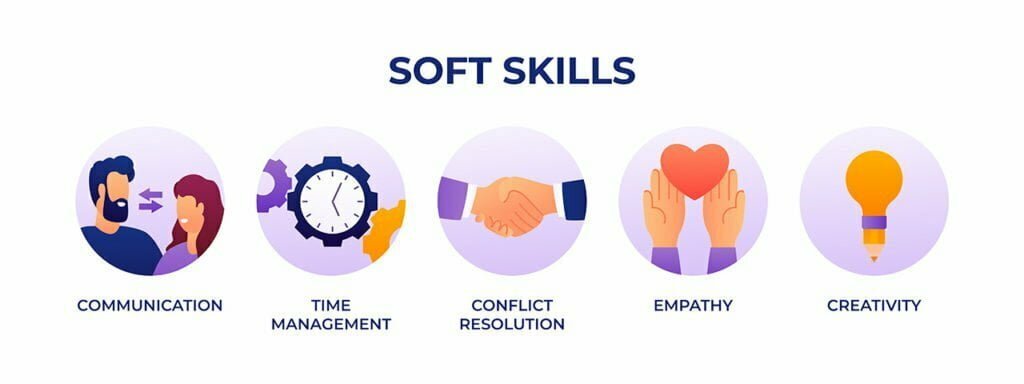Какие софт-скиллы важны для развития карьеры в IT: советы от HR-экспертов

Современная индустрия информационных технологий является одной из наиболее динамично развивающихся отраслей экономики. Для того, чтобы успешно развиваться в этой сфере, необходимо обладать не только техническими навыками, но и софт-скиллами. Софт-скиллы — это личностные качества, которые позволяют эффективно общаться, работать в команде, управлять своим временем и эмоциями, разрешать конфликты и т.д.
В этой статье мы рассмотрим, какие софт-скиллы важны для развития карьеры в IT, и как их можно развивать. Наши советы основаны на мнении HR-экспертов, работающих в IT-компаниях.
1. Коммуникационные навыки
Развитая коммуникация — это ключевой навык для карьерного роста в IT-сфере. Работа в IT-компании обычно требует коммуникации с различными людьми, в том числе разработчиками, менеджерами, заказчиками и клиентами. Хорошо развитые навыки коммуникации помогут убедительно выступать перед аудиторией, эффективно общаться внутри команды и наладить отношения с клиентами.
Советы по развитию навыков коммуникации:
- Повышайте уверенность в себе. Это поможет выступать более убедительно и проявлять инициативу в команде.
- Развивайте эмпатию. Попробуйте поставить себя на место другого человека и понять его точку зрения.
- Общайтесь со своими коллегами на равных. Не бойтесь задавать вопросы и обсуждать идеи.
- Развивайте навыки публичных выступлений. Выступайте перед коллегами на собраниях или конференциях, пишите блоги или статьи на темы, связанные с вашей работой.
2. Управление временем
Управление временем — это навык, который позволяет эффективно распределять свое время и управлять приоритетами. В IT-сфере, где проекты обычно имеют строгие сроки, хорошие навыки управления временем могут помочь достичь успеха и не потерять контроль над работой.
Советы по развитию навыков управления временем:
- Составляйте план работы на день/неделю/месяц. Это позволяет определить приоритеты и эффективно использовать свое время.
- Используйте методы управления временем. Существует множество методик, таких как метод Помодоро или GTD, которые помогают эффективно использовать время и управлять приоритетами.
- Устанавливайте реалистичные сроки. Важно учитывать реальное время, необходимое для выполнения задач, и устанавливать сроки, соответствующие этому времени.
- Избегайте отвлечений. Необходимо уметь избегать отвлекающих факторов, таких как социальные сети или почта, чтобы максимально сосредоточиться на работе.
3. Работа в команде
Работа в команде — это еще один важный навык, который необходим для успешной карьеры в IT-сфере. Большинство проектов в IT-компаниях являются коллективными, и только тесное взаимодействие в команде позволяет добиваться поставленных целей и выполнить проект в срок. Хорошие навыки работы в команде также помогают быстрее решать проблемы, делясь опытом и идеями со своими коллегами.
Советы по развитию навыков работы в команде:
- Выстраивайте позитивные отношения с коллегами. Хорошие отношения между членами команды помогают эффективному взаимодействию и добиванию общих целей.
- Умейте слушать и выражать свои мысли. Важно уметь выслушивать мнение других членов команды, а также уметь ясно выражать свои мысли.
- Распределяйте задачи. Распределение задач позволяет оптимизировать процесс работы в команде и обеспечить эффективное использование времени.
- Учитесь компромиссам. В работе в команде часто приходится находить компромиссы между разными точками зрения, что помогает достигать общих целей.
4. Адаптация к изменениям
IT-отрасль очень динамична, поэтому способность адаптироваться к изменениям является необходимой для успеха в карьере. Компании, проекты, технологии могут меняться, и важно быть готовым к этим изменениям.
Что можно сделать для развития навыков адаптации к изменениям:
- Оставаться гибким и открытым для новых идей и изменений.
- Принимать изменения как возможность для роста и развития.
- Развивать умение быстро адаптироваться к новым условиям и быстро переключаться между задачами.
5. Решение проблем
Развитые навыки решения проблем — это еще один важный софт-скилл для успешной карьеры в IT-сфере. IT-специалисты часто сталкиваются с нестандартными задачами, которые требуют творческого подхода к их решению.
Советы по развитию навыков решения проблем:
- Изучайте новые технологии. В IT-сфере непрерывно появляются новые технологии и инструменты, которые помогают решать задачи более эффективно. Изучение новых технологий помогает шире мыслить и находить нестандартные решения проблем.
- Анализируйте проблемы. Важно уметь анализировать проблемы и определять их корни, чтобы выбрать наиболее эффективный подход к их решению.
- Применяйте творческий подход. Необходимо уметь думать творчески и находить нестандартные решения проблем. Иногда решение проблемы может быть найдено с помощью простых идей, которые не приходят на ум сразу.
- Общайтесь с коллегами. Общение с коллегами и обмен опытом может помочь найти эффективное решение проблемы.
6. Лидерские навыки
Навыки лидерства играют важную роль в карьере IT-специалистов. Умение эффективно руководить командой и мотивировать ее на достижение общих целей может не только повысить эффективность работы, но и ускорить карьерный рост.
Что можно сделать для развития лидерских навыков:
- Учитесь делегировать задачи. Лидер должен уметь распределять задачи и делегировать их наиболее подходящим членам команды.
- Развивайте умение руководить. Умение руководить командой — это важный навык для лидера. Лидер должен уметь мотивировать членов команды и создавать благоприятную атмосферу для работы.
- Учитесь принимать решения. Лидер должен уметь принимать сложные решения и не бояться ответственности за свои действия.
- Развивайте умение убеждать. Лидер должен уметь убеждать других в правильности своих идей и планов.
7. Умение обучать других
IT-сфера постоянно меняется и развивается, и для успешной карьеры в этой сфере важно уметь обучать других членов команды и коллег новым технологиям и методикам.
Советы по развитию умения обучать других:
- Развивайте умение объяснять сложные вещи простым языком. Хороший учитель должен уметь объяснить сложные вещи простым языком, чтобы другие могли понять.
- Учитесь создавать обучающие материалы. Создание обучающих материалов, таких как видеоуроки и презентации, поможет другим учиться новым технологиям и методикам.
- Развивайте умение подстраиваться под уровень знаний других. Хороший учитель должен уметь подстраиваться под уровень знаний других и настраивать учебный процесс соответствующим образом.
Что-то еще?
Кроме перечисленных выше soft-скиллов, существуют и другие, которые также важны для развития карьеры в IT:
- Аналитическое мышление. Аналитические навыки помогают разбираться в сложных проблемах, находить решения и принимать обоснованные решения на основе данных и фактов.
- Самомотивация. IT-сфера нередко связана с длительными периодами работы над проектами и задачами, которые могут казаться монотонными или трудными. Умение самому себя мотивировать и сохранять интерес к работе может помочь достигнуть успеха.
- Умение давать и принимать обратную связь. Обратная связь помогает улучшать работу команды и повышать эффективность работы, поэтому важно уметь давать и принимать обратную связь конструктивно и дипломатично.
- Культурная компетентность. Сфера IT имеет международный характер, и профессионалы в этой области должны понимать культурные различия и уметь работать в мультикультурной среде.
Важно помнить, что soft-скиллы не менее важны, чем hard-скиллы, и являются неотъемлемой частью успеха в карьере в IT-сфере. Существует большое количество онлайн-курсов для развития различных софт скиллов. Вы можете ознакомиться с ними в каталоге курсов GeekLink.
Заключение
Развитие софт-скиллов важно для карьерного роста в IT-сфере. Хороший IT-специалист должен иметь не только технические навыки, но и софт-скиллы, такие как коммуникация, лидерство, умение работать в команде, умение обучать других и управлять временем. Развитие этих навыков поможет стать более эффективным и ценным участником команды и добиться успеха в карьере.
Список использованных источников:
- «The Importance of Soft Skills in the IT Industry.» Indeed Career Guide
- «Soft Skills to Help Your IT Career.» Robert Half
- «10 Soft Skills Every IT Manager Needs.» CIO
- «Why Emotional Intelligence is a Game Changer in the Tech Industry.» The Muse
- «Why Communication Skills are Vital to Your Tech Career.» TechRepublic
- «5 Essential Soft Skills That Will Help You Get Ahead in Tech.» Forbes






 , а затем
, а затем
Комментарии